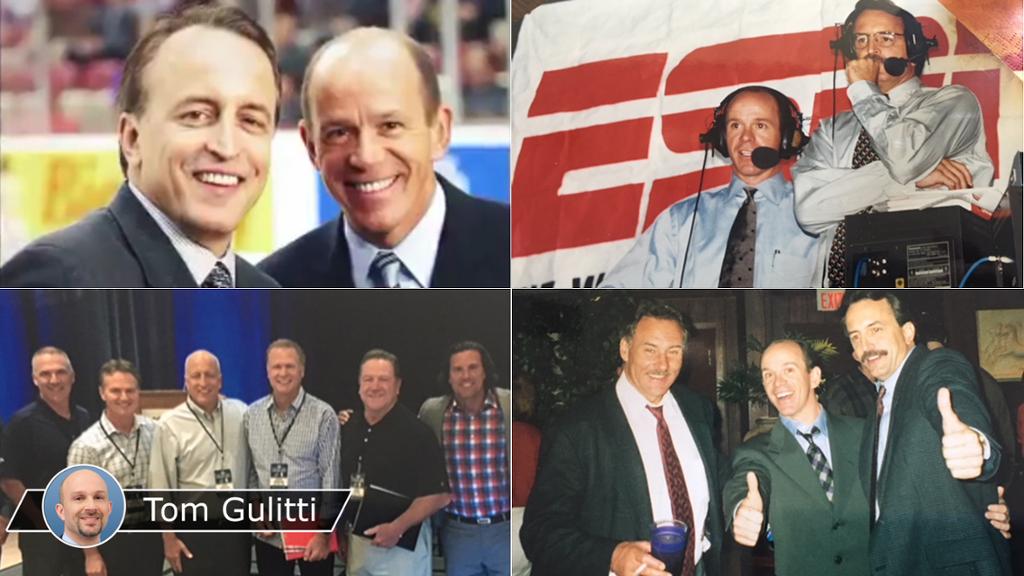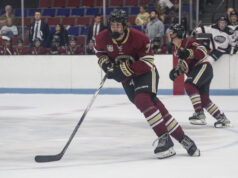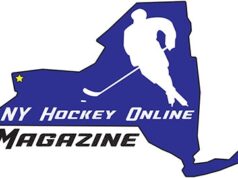Colleagues share stories of late play-by-play man, winner of Foster Hewitt Memorial Award —
By Tom Gulitti @tomgulittinhl / NHL.com Staff Writer–
During his battle with bile duct cancer, Dave Strader liked to have events or days to look forward to. The Hockey Hall of Fame NHL Media Awards Luncheon, which will be held in Toronto on Monday, was definitely one of them. Strader was to receive the Foster Hewitt Memorial Award for his outstanding contributions as a hockey broadcaster.
Strader died on Oct. 1 at age 62, but the ceremony will go on, giving those close to him another chance to remember what made him special as a person and a play-by-play announcer. Fox Sports Arizona reporter Todd Walsh, who worked with Strader on Arizona Coyotes telecasts, will speak on his behalf.
A native of Glens Falls, New York, Strader began his 38-year broadcasting career in 1979 as the radio announcer and public relations director for the Adirondack Red Wings of the American Hockey League. The Detroit Red Wings promoted him in 1985, and he spent 11 seasons working on their telecasts.
Known as “The Voice” for his smooth baritone, Strader went on to call games nationally for ESPN, ABC, Fox, Versus (now NBSCN) and NBC. He also worked on regional telecasts for the Florida Panthers, Coyotes and Dallas Stars.
NHL.com talked to some of Strader’s former color analysts about their memories of working with him. Here are their stories:
Mickey Redmond, Red Wings
“In 1985, [then-Red Wings chief operating officer] Jim Lites called me and said, ‘I’m going to bring in a young kid from Glens Falls,’ and I believe he had never done NHL games before and he had never done television before. At the time, I was getting my roots back in the Detroit area. I had done some ESPN stuff and Jimmy called me said, ‘I’d really like to have you be our color guy and help bring Dave along and get him acclimated to the NHL and television.’ I said, ‘That would be great. Let’s give it a go.’ And that’s how the whole thing started.”
Darren Pang, ESPN, NHL International, NHL Radio, Coyotes, NBCSN.
“A lot of things differentiated Dave from some of the other play-by-play guys. No. 1, his personality was like that of a player in the locker room. He had such a fun personality that he could rib you just like we would do in the locker room. As a broadcaster, one thing that all of us analysts who worked with Dave Strader would say is that he thought like an analyst. When you’re doing the game and you’re analyzing it, there’s a lot of times you’re not getting that connection with the play-by-play guy because they don’t understand some of the nuances or sometimes they don’t understand a certain matchup or what the coach has just done. But I believe that because Dave Strader was such a good basketball player, his high school team is in the Hall of Fame in Glens Falls, he saw the game of basketball and grew into that in seeing the game of hockey.”
Brian Engblom, ESPN, NBCSN
“Strades was just so easy to work with. It starts with his personality, always an easygoing personality both on the air and off the air. We were really good friends. He was one of my best friends, so that always made it more enjoyable as well. Always prepared, always did his homework, and he was just really easy on the air. … A lot of times off the air and right before air time was great because he had a sense of humor that would just crack the [production] truck up. His favorite line would be, ‘All right crew, let’s have a great game tonight. Second star is up for grabs.’ And everybody would be roaring, laughing because Strades could get away with that. He’d be chuckling away and then they’d [count down], ’10, 9, 8, 7 …’ and away we’d go.”
Ray Ferraro, ESPN
“I was on the set and the producer came to me and said, ‘Call travel. You need to go to Dallas. You’ve got a game tomorrow.’ And I’m like, ‘To do what?’ He said, ‘Color,’ I had never done it. They said, ‘That’s fine.’ So I fly down there and we have a meeting at noon. I meet Dave. I knew him from around, but I actually meet him and the producer and they’re talking about the opening and I don’t know what they’re talking about. And Dave kept saying, ‘Don’t worry. I’ll walk you through it.’
“We tape the open on the ice and then we go upstairs, and my heart is just thumping away. We get up to the booth, the puck drops and for like three minutes there’s no whistle. The puck goes up and down the ice and I’ve got no sense of when maybe I could jump in or not. And looking back he laid out a couple times, but I didn’t know enough that that was the time. Finally, he just asked me a question to bring me into the broadcast and I said whatever I said. After that, he often joked he should have never asked me that question because once he did I’ve never stopped [talking].”
Denis Potvin, ESPN, Panthers
“The first thing about Dave Strader was his personality, his constant smile. He made everybody, or he at least made me feel like I’d known him for a long, long time, and that was very special. He treated me that way personally and in the booth. The immediate response to his play-by-play was that he gave me and other analysts a sense that you are really the star here, tell people what you think. … There was passion in his voice, passion in what he brought to the game.”
Jim Fox, NHL Radio
“What stood out to me is he loved to chirp. He was always on, just back and forth with whoever he was working with and always on top of you and giving you a little shot here and there. But always playful, always fun. That’s the thing I think was different for him. That certainly created an environment that — we knew we had a job to do, but we also knew we would have a great time doing it with each other.”
Tyson Nash, Coyotes
“He got me raw. That was my first year in TV and he babysat for a couple years with me. The patience that he showed me, how he taught me, really everything about him, he was a great leader. I played with some great leaders in the NHL in Chris Pronger and Al MacInnis and Shane Doan, and as far as the broadcasting industry goes, he was a leader. He showed me the ropes, he showed me how to work, he showed me how to prepare and he taught me the grind. It was a different grind. It wasn’t a physical grind, but it was a mental grind and he showed me how to get through it when you weren’t feeling good and how to simplify stuff on nights when you just didn’t have it going and then how to really ride it when you did have it going. He was just so much fun work with.”
Daryl Reaugh, ESPN, Versus/NBCSN, Stars
“Everyone feels just terrible that he wasn’t able to fend [cancer] off long enough to go [to the ceremony Monday]. For any of us, but certainly for a guy like him who is so universally liked and everybody had respect for, the idea that he was getting [the Foster Hewitt Award], you couldn’t find anybody who was like, ‘Really? Dave Strader’s getting that award?’ It was like, ‘Of course. Why did it take so long?’
“The last conversation I had with Dave we were just talking and I said, ‘Do you have your speech lined up or are you still working on it?’ And that was the first time, the only time, that he just flat out said to me, ‘Razor, I don’t think I’m going to get there.’ That was gut-wrenching to hear him say it. It will be touching however it is passed out and whoever speaks, but I feel really terrible that he couldn’t make it that far.”







